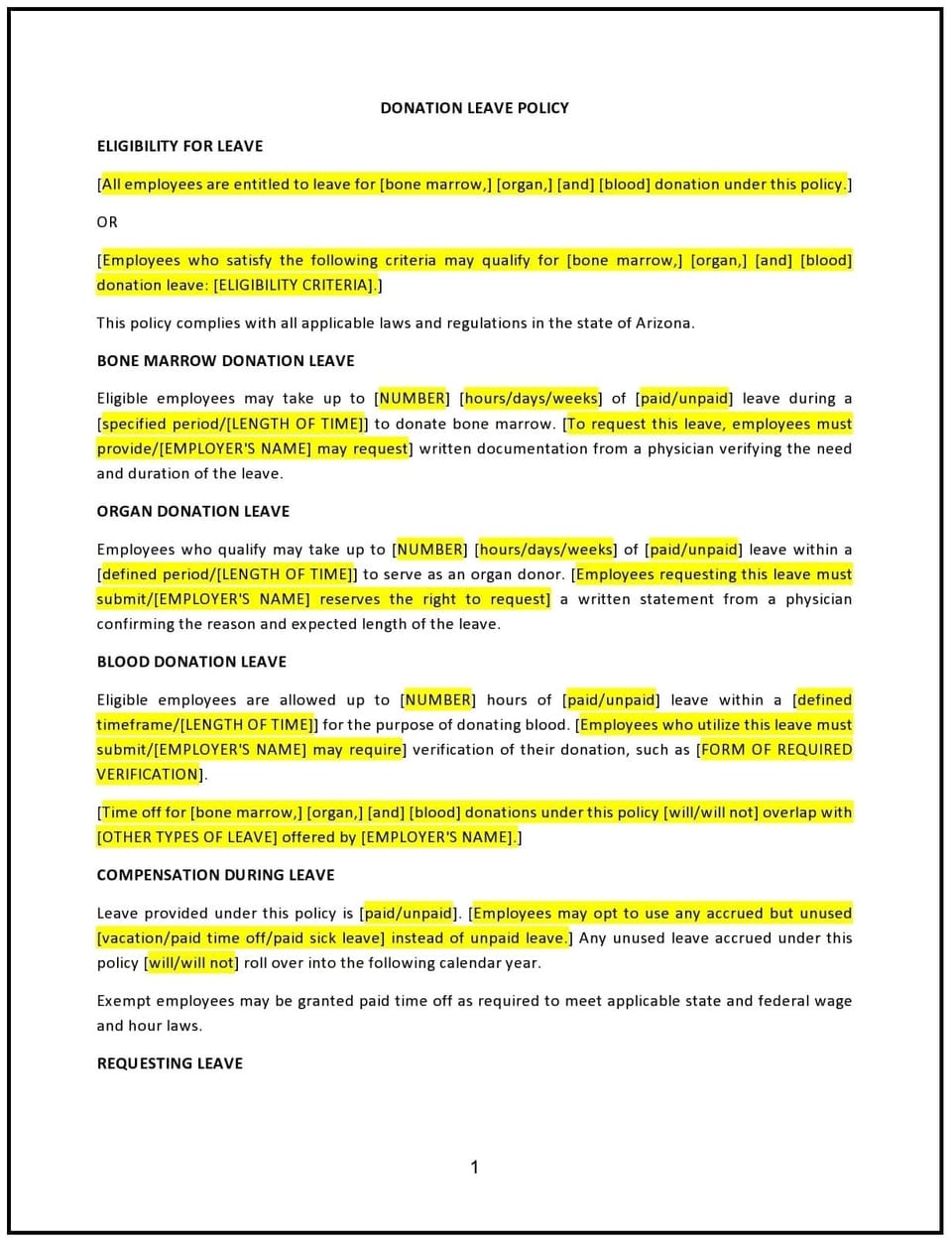Donation leave policy (Arizona): Free template

Donation leave policy (Arizona)
In Arizona, a donation leave policy provides employees with time off to donate blood, organs, or other life-saving resources. This policy promotes social responsibility and supports employee well-being while aligning with federal and state laws, including Arizona’s Organ Donation Leave Act.
This policy outlines eligibility requirements, the process for requesting leave, and the duration of leave allowed for different types of donations. By implementing this policy, Arizona businesses can encourage community impact while maintaining workplace productivity.
How to use this donation leave policy (Arizona)
- Define leave types: Specify the types of donations covered, such as blood, bone marrow, or organ donations, and the corresponding leave durations.
- Establish eligibility: Clearly outline which employees qualify for donation leave, including tenure or role-specific requirements if applicable.
- Provide request procedures: Detail how employees can request donation leave, including notice periods and any required documentation, such as proof of appointment.
- Include paid or unpaid provisions: Indicate whether donation leave is paid or unpaid, and provide guidance on using accrued paid leave if applicable.
- Address job protection: Specify that employees’ jobs are protected during the leave period, as required by Arizona’s Organ Donation Leave Act.
Benefits of using a donation leave policy (Arizona)
This policy offers key advantages for Arizona businesses:
- Encourages social responsibility: Demonstrates the organization’s commitment to community well-being and life-saving initiatives.
- Supports compliance: Aligns with Arizona’s Organ Donation Leave Act and related labor laws, minimizing legal risks.
- Enhances employee morale: Provides employees with the flexibility to participate in meaningful contributions without compromising their job security.
- Boosts retention: Strengthens loyalty by showing the company values its employees’ altruistic efforts.
- Protects productivity: Establishes clear procedures for managing leave requests, reducing operational disruptions.
Tips for using a donation leave policy (Arizona)
- Include Arizona-specific guidelines: Ensure the policy reflects requirements under the state’s Organ Donation Leave Act and any industry-specific considerations.
- Provide manager training: Educate supervisors on handling donation leave requests with sensitivity and understanding.
- Promote the policy: Encourage awareness by sharing the policy with employees and highlighting the company’s support for life-saving initiatives.
- Monitor usage: Track donation leave usage to ensure equitable access and identify any potential issues with implementation.
- Review regularly: Update the policy to reflect changes in laws or business needs, ensuring continued relevance and compliance.
Q: What types of donations are covered under this policy?
A: The policy typically covers blood, organ, and bone marrow donations, with specific leave durations outlined for each type.
Q: How much leave is provided for organ donation in Arizona?
A: Under Arizona’s Organ Donation Leave Act, employees are entitled to up to 30 days of unpaid leave for organ donation.
Q: Is donation leave paid or unpaid?
A: Donation leave may be unpaid unless otherwise specified in the policy. Employees can use accrued paid leave if allowed by the employer.
Q: How can employees request donation leave?
A: Employees should submit a formal request to HR or their manager, providing reasonable notice and any required documentation, such as proof of the donation appointment.
Q: How does this policy support compliance with Arizona laws?
A: The policy aligns with Arizona’s Organ Donation Leave Act by providing job-protected leave for eligible employees participating in life-saving donations.
This article contains general legal information and does not contain legal advice. Cobrief is not a law firm or a substitute for an attorney or law firm. The law is complex and changes often. For legal advice, please ask a lawyer.


